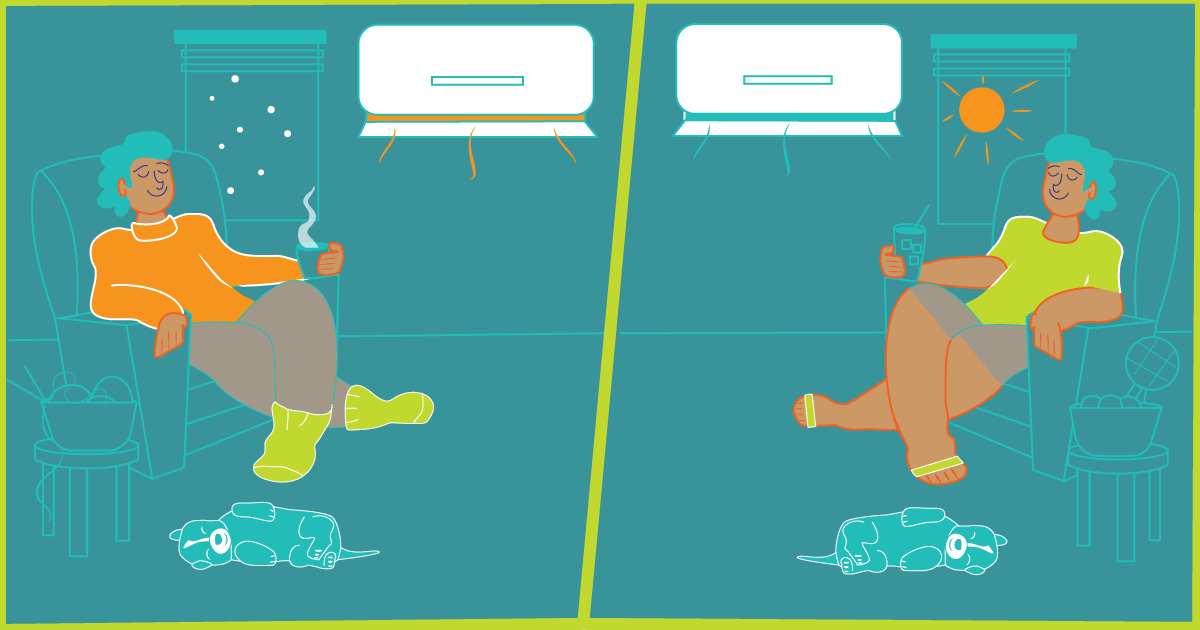Swapping Heat Pumps for Wood Stoves in Cowichan Valley, BC

THE PROJECT
With funding from the provincial wood stoves exchange program, and in collaboration with BC Lung and Island Health, the Cowichan Valley Regional District (CVRD) established a Wood Stove Replacement Program that encourages residents to swap out wood-burning stoves with heat pumps. The program, the original goal of which was to reduce dangerous levels of air pollution and negative health outcomes, now also aims to reduce the emission of greenhouse gases that contribute to climate change.
BACKGROUND
CVRD is an area on Vancouver Island that stretches inland from Victoria to Nanaimo. Most of the region’s 83,900 residents live in the Cowichan Valley, surrounded by mountains.
The CVRD’s population resides in four unique municipalities (55%), nine Electoral Areas (40%), and 10 First Nations communities (5%). The average income of residents in this area is lower than the Canadian average.
Many of the residents in the region burn wood to heat their homes. During certain weather conditions, the air settles in the valley, trapping the air pollution from wood-burning stoves and other sources. These conditions can produce very high levels of air pollution that create significant risks to human health.
The 24-hour health-based air standard for fine particulate matter (PM2.5) of 25 ug/m3 has been exceeded on a frequent basis for many years in the CVRD. PM2.5 has been clearly associated with a broad array of negative health outcomes including asthma, heart disease, lung cancer, hospital admissions, and premature deaths.
A 2014 emissions inventory done in the CVRD estimated that open burning and wood-burning appliances account for 53% and 23% respectively of the PM2.5 in the air.
THE PROCESS
The CVRD Wood Stove Replacement Program was established in 2009 to reduce air pollution and its negative health outcomes for people in the region.
“The CVRD worked closely with Dr. Hasselback, a Medical Health Officer with Island Health, and a local meteorologist, Earle Plain, to demonstrate to the province, the need for funding to support the replacement of old wood stoves in our district,” offered Ilse Sarady, Senior Environmental Technologist with CVRD. “Island Health demonstrated that children in this area were admitted to the hospital for respiratory diseases at rates 70% higher than those for the province from 1998 to 2012. It also found that people who are 5 to 54 years of age in this region are diagnosed with asthma at rates 14% higher than the province as a whole”.
In the early years of the program, it’s goal was to replace old wood stoves with new CSA/EPA certified wood stoves that reduce air pollution while increasing wood-burning efficiency by about 30%. It included rebates, a promotional campaign, and educational workshops to build awareness about the health concerns associated with wood burning, clean burning practices, the benefits of new wood stoves, and the rebates being offered.
“For several years, natural gas appliances were added to the alternatives that could be used to replace wood stoves but that option was removed in 2020,” explained Ilse. “We felt that we could not justify using tax dollars to incentivize fossil fuel appliances that undermine our climate goals.”
In 2019, heat pumps were added to the list of alternatives.
“Heat pumps are highly efficient,” offered Ilse. “They can also cool a home in the summer, keeping people safe during extreme heat, something that is becoming increasingly important.”
The CVRD allows people to “stack” rebates. CVRD rebates can be combined with those offered by provincial and federal agencies. While the program’s new focus on heat pumps aligns with the rebates funded by the Federation of Canadian Municipalities, the CVRD continues to offer rebates for wood and pellet heating appliances as well, recognizing that many residents cannot afford heat pumps.
“Heat pumps are expensive. It can cost around $6,000 for a high-efficiency mini-split system with only one head and over $13,000 for a bigger system that is ducted or has more heads,” explained Ilse. “The value of the heat pump rebate must be more generous to be meaningful, particularly when being offered to residents who live on lower incomes. It is also unrealistic to assume that people can front that kind of money. Low interest loans and other rebate program designs, like those offered for electric vehicles in BC, may work better”.
In 2018, CVRD started to experiment with the value of rebates offered to see how that would affect uptake. EPA woodstoves accounted for 90% of new appliances in 2017 when the same rebate ($300) was offered for all new appliances. When the rebates for cleaner appliances were increased in 2019 to $600 for gas, pellet and electric stoves and $900 for heat pumps, the woodstove alternatives dropped by 25% in popularity, while gas stoves and heat pumps increased.
The 2022 program emphasizes the replacement of old woodstoves with heat pumps to align with the CVRD’s climate and air quality objectives. Heat pumps will also help people to stay cool during summer heatwaves and improve indoor air during poor air quality events. The CVRD will offer:
- A $2,000 rebate to replace a wood stove with a heat pump;
- An $800 rebate to replace a wood stove or outdoor wood boiler with a pellet appliance with a 2020 or newer EPA-certified pellet stove or pellet boiler; and
- A $350 rebate to replace an uncertified wood-burning appliance or an EPA- or CSA-certified wood stove that is at least 5 years old with a 2020 or newer EPA-certified woodstove.
In 2021, the CVRD received $42,000 in funding from the province; $40,000 was directed towards rebates, $1,000 towards advertisements, and $1,000 towards material production. The CVRD contributed $15,000 for rebates and in-kind support by covering the Program Coordinator’s time, the public awareness campaign, and the public outreach.
To qualify for the rebate, residents must render their woodstove unusable and drop them of at a CVRD recycling center where an attendant will verify that the woodstove was received. The drop-off is free of charge. All member municipalities waive any permit fees associated with the installation of new heating appliances under the rebate program. Local retailers are also asked to offer a minimum discount of $50 on new woodstoves, $50 on pellet boilers, and $150 on heat pumps.

The CVRD has employed a number of different strategies to educate the public on the rebate program. It:
- Maintains a website that links people to information about rebates, burning by-laws, the health impacts of wood smoke, how heat pumps work, real-time air quality readings, and an on-line course on wood-burning;
- Launched the ‘Clear the Air Cowichan’ smoke pollution awareness campaign that addresses backyard burning, land clearing burning, smarter home heating, the health effects of burning, and the burning regulations in 2012;
- Developed a ‘Citizen Air Quality Awareness Project’ in 2017 that included the placement of air pollution sensors in different neighbourhoods across the district;
- Produced a ‘Healthier Home Heating’ video that explains why the Cowichan region has so many air quality advisories, the role that wood stoves play, and the health impacts associated with this type of air pollution. It also includes interviews with two couples who talk about their experience replacing their wood stoves with heat pumps (CVRD, Program Proposal, 2021).
OUTCOMES ACHIEVED
As of September 2021, the Wood Stove Replacement Program has replaced a total of 1,172 old woodstoves or about 100 per year.
To date, 28 heat pumps have been supported by this program. The CVRD started promoting heat pumps in 2019 and the number of swap-outs slowed down in 2020 and 2021. It is assumed that the slow down was due to the COVID19 pandemic.
Since the program start, air pollution in the CVRD has been downgraded by the province from being a “red-zone” to an “orange zone”, which shows that the air quality has improved over recent years.
LESSONS LEARNED
Over the 13 years that the CRVD has run the Wood Stove Replacement Program, some valuable lessons have been learned:
- Rebates need to be high enough to help offset the cost of the preferred heating alternatives;
- Rebate programs should encourage people to switch to the technology that offers the greatest health and climate benefits;
- The way the rebate program is currently set up, whereby a resident must front the cost of the heating appliance and then seek a rebate afterwards, is not a feasible model for many residents;
- The policy requiring people to remove and scrap their existing wood stoves to be eligible for the rebates can be a disincentive to some because this region is prone to power outages; and
- The program will need to be scaled up significantly to successfully replace all old polluting woodstoves in the region in a timely fashion. The BC Ministry of the Environment has estimated that 4,700 old, highly polluting woodstoves in the region need to be retired. At the current replacement rate of 100 per year, it could take 47 years to replace all of these old stoves.
Prepared by Kim Perrotta, MHSc, Executive Director, CHASE
Last modified: May 11, 2023
